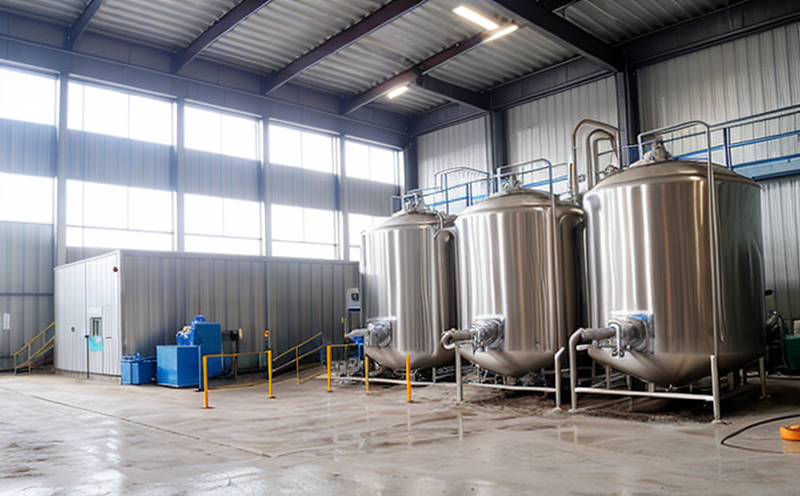ASTM D4191 Dissolved Oxygen Nitrogen Carbon Dioxide Test in Process Water
The ASTM D4191 standard provides a comprehensive approach to measuring dissolved oxygen, nitrogen, and carbon dioxide concentrations in process water. This service is crucial for ensuring that industrial processes operate within specified parameters, which directly impacts product quality, environmental compliance, and operational efficiency.
Process water plays an essential role in various industries such as pharmaceuticals, food & beverage, chemical manufacturing, and power generation. The presence of dissolved oxygen (DO), nitrogen, and carbon dioxide can significantly affect the performance and longevity of equipment, the safety of end products, and the overall environmental footprint of industrial processes.
The ASTM D4191 test is particularly important for industries where water quality directly influences product purity or safety. For example, in pharmaceutical manufacturing, DO levels can influence microbial growth, which must be controlled to ensure drug efficacy and safety. Similarly, in power generation, the presence of gases like nitrogen and carbon dioxide can impact boiler efficiency and lifespan.
The test method involves collecting a representative sample of process water from within the industrial facility. The sample is then analyzed using gas chromatography or other suitable analytical techniques to determine the concentrations of dissolved oxygen, nitrogen, and carbon dioxide. This data helps in identifying potential issues such as contamination, leaks, or inefficiencies in the water treatment system.
Regular monitoring and adherence to ASTM D4191 guidelines ensure that industrial processes remain within specified limits, thereby enhancing product quality, operational efficiency, and environmental sustainability.
Why It Matters
The importance of ASTM D4191 testing in process water cannot be overstated. Proper management of dissolved oxygen, nitrogen, and carbon dioxide levels is essential for maintaining the integrity and performance of industrial processes. Below are some key reasons why this service matters:
- Product Quality: Dissolved oxygen can support microbial growth, which may compromise product purity or safety. By adhering to ASTM D4191 standards, industries ensure that their end products meet stringent quality and safety requirements.
- Operational Efficiency: Excessive levels of nitrogen and carbon dioxide in process water can lead to inefficiencies in equipment such as boilers and reactors. Regular monitoring helps identify and address these issues early, thereby optimizing operational performance.
- Environmental Compliance: Many industries are subject to stringent environmental regulations regarding water quality. ASTM D4191 testing ensures compliance with local, national, and international standards, helping companies avoid costly penalties.
- Safety: Controlling dissolved oxygen levels is critical in preventing explosions or other hazardous incidents within industrial facilities. This service helps ensure a safe working environment for employees and the community.
- Cost Reduction: By identifying and addressing issues early, companies can avoid costly downtime and repairs. Additionally, maintaining optimal water quality extends the lifespan of equipment, reducing long-term maintenance costs.
Scope and Methodology
The ASTM D4191 standard outlines specific procedures for determining dissolved oxygen, nitrogen, and carbon dioxide concentrations in process water. The scope includes:
- Determination of dissolved oxygen (DO) using an appropriate method such as the Winkler method or a dissolved oxygen meter.
- Analysis of total nitrogen content through various techniques including gas chromatography.
- Measurement of carbon dioxide levels by titration or other suitable methods.
The methodology involves collecting representative samples from different points within the industrial facility. These samples are then analyzed using the specified instruments and methods to ensure accuracy and reliability. The results provide a comprehensive understanding of water quality, enabling informed decision-making regarding process optimization and compliance with regulatory requirements.
Compliance with ASTM D4191 standards ensures that all testing procedures adhere to internationally recognized guidelines, providing consistent and accurate data across various industries.
Customer Impact and Satisfaction
Our clients benefit significantly from our ASTM D4191 testing services. By providing accurate and reliable data on dissolved oxygen, nitrogen, and carbon dioxide concentrations, we enable customers to make informed decisions that enhance product quality, operational efficiency, and environmental sustainability.
- Improved Quality Control: Regular testing helps identify potential issues early, allowing for timely corrective actions. This ensures that products meet the highest standards of purity and safety.
- Enhanced Operational Efficiency: By optimizing water quality based on ASTM D4191 results, industries can reduce downtime and extend equipment lifespan, leading to higher productivity and lower operational costs.
- Better Compliance: Our testing ensures that clients meet all relevant environmental and safety regulations. This reduces the risk of legal penalties and enhances compliance records.
- Increased Customer Trust: By providing transparent and accurate data on water quality, we help build trust with customers and stakeholders, which is crucial for maintaining a positive brand image.
We pride ourselves on delivering exceptional service that exceeds expectations. Our team of experts ensures that every test is conducted with the highest level of accuracy and professionalism, contributing to long-term success for our clients.





